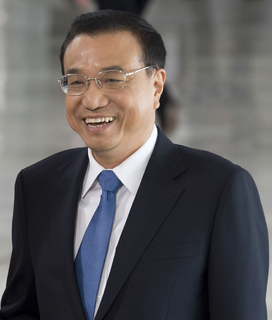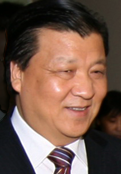| 18th National Congress of the Communist Party of China | |||||||
 | |||||||
| Simplified Chinese | 中国共产党第十八次全国代表大会 | ||||||
|---|---|---|---|---|---|---|---|
| |||||||
| Abbreviation | |||||||
| Chinese | 十八大 | ||||||
| |||||||
The 18th National Congress of the Communist Party of China began on November 8, 2012 [1] at the Great Hall of the People. It was preceded by the 17th National Congress of the Communist Party of China. [2] [3] Due to term and age limits restrictions, seven of the nine members of the powerful Politburo Standing Committee (PSC) retired during the Congress, including Hu Jintao, who was replaced by Xi Jinping as General Secretary of the Communist Party of China. The Congress elected the 18th Central Committee of the Communist Party of China, and saw the number of Politburo Standing Committee seats reduced from nine to seven. It was succeeded by the 19th National Congress of the Communist Party of China.

The Great Hall of the People is a state building located at the western edge of Tiananmen Square in Beijing. It is used for legislative and ceremonial activities by the government of the People's Republic of China (PRC) and the ruling Communist Party of China. The People's Great Hall functions as the meeting place for the full sessions of the National People's Congress (NPC), the Chinese legislature, which occurs every year during March along with the national session of the Chinese People's Political Consultative Conference (CPPCC), a political advisory body. It is also the meeting place of the National Congress of the Communist Party of China, which, since 1982, has occurred once every five years and the party's Central Committee which meets approximately once a year.
The 17th National Congress of the Communist Party of China was held in Beijing, China, at the Great Hall of the People from 15 to 21 October 2007. The Congress marked significant shift in the political direction of the country as CPC General Secretary Hu Jintao solidified his position of leadership. Hu's signature policy doctrine, the Scientific Development Concept, which aimed to create a "Socialist Harmonious Society" through egalitarian wealth distribution and concern for the country's less well-off, was enshrined into the Party Constitution. It was succeeded by the 18th National Congress of the Communist Party of China.

Hu Jintao is a Chinese politician who was the paramount leader of China from 2002 to 2012. He held the offices of General Secretary of the Communist Party from 2002 to 2012, President of the People's Republic from 2003 to 2013 and Chairman of the Central Military Commission from 2004 to 2012. He was a member of the Politburo Standing Committee, China's de facto top decision-making body, from 1992 to 2012.
Contents
- Delegates
- Revisions to the Party Constitution
- Leadership changes
- The Politburo Standing Committee
- The Politburo
- The Secretariat
- Ministerial positions
- See also
- Notes
- References
- External links
The seven PSC members elected during the Congress were Xi Jinping, Li Keqiang, Zhang Dejiang, Yu Zhengsheng, Liu Yunshan, Wang Qishan and Zhang Gaoli. Five of these were identified as associates or having benefited from the patronage of former Communist Party leader Jiang Zemin, who reportedly exerted considerable influence in shaping the composition of the new Standing Committee. Only Li Keqiang and Liu Yunshan are considered to be members of the tuanpai. [4]

Xi Jinping is a Chinese politician serving as General Secretary of the Communist Party of China (CPC), President of the People's Republic of China (PRC), and Chairman of the Central Military Commission (CMC). Often described as China's "paramount leader" since 2012, he officially received the title of "core leader" from the CPC in 2016. As general secretary, Xi holds an ex-officio seat on the Politburo Standing Committee of the Communist Party of China, China's top decision-making body.

Li Keqiang is a Chinese politician who is the current Premier of the State Council of the People's Republic of China. An economist by trade, Li is China's head of government as well as one of the leading figures behind China's Financial and Economic Affairs, Foreign Affairs, National Security and Deepening Reforms. He is also the second-ranked member of the Politburo Standing Committee of the Communist Party of China, the de facto top decision-making body of the country. Li is a major part of the "fifth generation of Chinese leadership" along with General Secretary Xi Jinping. Li was named the world's 12th most powerful person by Forbes in their list of the world's most powerful people in 2015 and 2016.

Zhang Dejiang is a retired Chinese politician. He served as the Chairman of the Standing Committee of the 12th National People's Congress, roughly the equivalent of a speaker of parliament in other countries between 2013 and 2018. He was also a member of the Politburo Standing Committee of the Communist Party of China, deputy head of the National Security Commission and the top official responsible for Hong Kong and Macau affairs.














